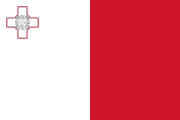
Malta competed at the 2011 World Aquatics Championships in Shanghai, China between July 16 and 31, 2011.

Malta competed at the 2011 World Aquatics Championships in Shanghai, China between July 16 and 31, 2011.
Malta qualified 3 swimmers. [1]
| Athlete | Event | Heats | Semifinals | Final | |||
|---|---|---|---|---|---|---|---|
| Time | Rank | Time | Rank | Time | Rank | ||
| Andrew Chetcuti | Men's 50m Freestyle | 23.65 | 43 | did not advance | |||
| Men's 50m Butterfly | 25.54 | 37 | did not advance | ||||
| Andrea Agius | Men's 50m Breaststroke | 30.47 | 39 | did not advance | |||
| Men's 100m Breaststroke | 1:06.13 | 68 | did not advance | ||||
| Athlete | Event | Heats | Semifinals | Final | |||
|---|---|---|---|---|---|---|---|
| Time | Rank | Time | Rank | Time | Rank | ||
| Nicola Muscat | Women's 50m Freestyle | 27.56 | 45 | did not advance | |||
| Women's 50m Backstroke | 32.62 | 49 | did not advance | ||||
Maltese is a Semitic language derived from late medieval Sicilian Arabic with Romance superstrata spoken by the Maltese people. It is the national language of Malta and the only official Semitic and Afroasiatic language of the European Union. Maltese is a Latinised variety of spoken historical Arabic through its descent from Siculo-Arabic, which developed as a Maghrebi Arabic dialect in the Emirate of Sicily between 831 and 1091. As a result of the Norman invasion of Malta and the subsequent re-Christianization of the islands, Maltese evolved independently of Classical Arabic in a gradual process of latinisation. It is therefore exceptional as a variety of historical Arabic that has no diglossic relationship with Classical or Modern Standard Arabic. Maltese is thus classified separately from the 30 varieties constituting the modern Arabic macrolanguage. Maltese is also distinguished from Arabic and other Semitic languages since its morphology has been deeply influenced by Romance languages, namely Italian and Sicilian.

Malta, officially the Republic of Malta, is an island country in Southern Europe, located in the Mediterranean Sea. It consists of an archipelago between Italy, Tunisia and Libya. It lies 80 km (50 mi) south of Sicily and Italy, 284 km (176 mi) east of Tunisia, and 333 km (207 mi) north of Libya. The two official languages are Maltese, the only Semitic language in Europe and the European Union, and English. The country's capital is Valletta.
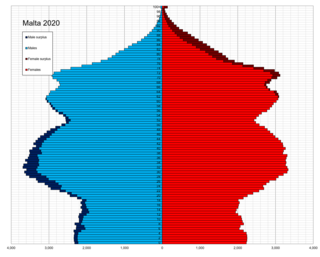
Demographic features of the population of Malta include population density, ethnicity, religious affiliations and other aspects of the population.

Valletta is the capital city of Malta and one of its 68 council areas. Located between the Grand Harbour to the east and Marsamxett Harbour to the west, its population as of 2021 was 5,157. As Malta’s capital city, it is a commercial centre for shopping, bars, dining, and café life. It is also the southernmost capital of Europe, and at just 0.61 square kilometres (0.24 sq mi), it is the European Union's smallest capital city.

The Sovereign Military Order of Malta (SMOM), officially the Sovereign Military Hospitaller Order of Saint John of Jerusalem, of Rhodes and of Malta, commonly known as the Order of Malta or Knights of Malta, is a Catholic lay religious order, traditionally of a military, chivalric, and noble nature. Though it possesses no territory, the order is often considered a sovereign entity under international law.

Malta has participated in the Eurovision Song Contest 35 times since its debut in 1971. The contest is broadcast in Malta on the PBS channel, TVM. Malta has yet to win the contest, but is the only non-winning country to have achieved four top three results.
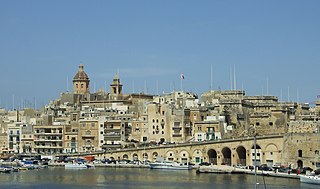
Birgu, also known by its title Città Vittoriosa, is an old fortified city on the south side of the Grand Harbour in the South Eastern Region of Malta. The city occupies a promontory of land with Fort Saint Angelo at its head and the city of Cospicua at its base. Birgu is ideally situated for safe anchorage, and over time it has developed a very long history with maritime, mercantile and military activities.

The prime minister of Malta is the head of government, which is the highest official of Malta. The prime minister chairs Cabinet meetings, and selects its ministers to serve in their respective portfolios. The prime minister holds office by virtue of their ability to command the confidence of the Parliament, as such they sit as members of Parliament.
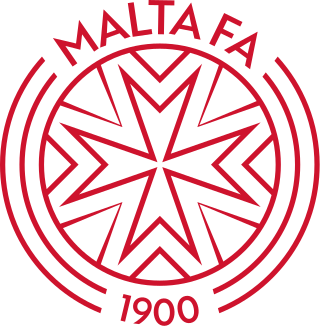
The Malta men's national football team represents Malta in international football and is controlled by the Malta Football Association, the governing body for football in Malta.

A European microstate or European ministate is a very small sovereign state in Europe. In modern usage, it typically refers to the six smallest states in Europe by area: Andorra, Liechtenstein, Malta, Monaco, San Marino, and Vatican City.
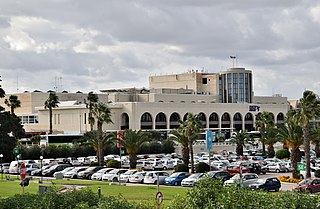
Malta International Airport is the only airport in Malta, and it serves the whole of the Maltese Islands. It is located on the island of Malta, southwest of the Maltese capital, Valletta, in the town of Luqa, and occupies the location of the former RAF Luqa. The airport serves as the main hub for KM Malta Airlines and Medavia besides being an operating base for Ryanair and its subsidiary Malta Air. It is also home to the Area Control Center and hosts the annual Malta Airshow. The airport is operated by Malta International Airport plc.

Valletta F.C. is a professional football club based in Valletta, the capital city of Malta, and will compete in the Maltese Challenge League, the Maltese second division following their relegation from the Maltese Premier League for the first time in their history in the 2023/24 season. The club was founded in 1943 after a merge of Valletta Prestons, Valletta St. Paul's and Valletta United, the latter being a two-time league winner before the Second World War.

The Maltese people are an ethnic group native to Malta who speak Maltese, a Semitic language and share a common culture and Maltese history. Malta, an island country in the Mediterranean Sea, is an archipelago that also includes an island of the same name together with the islands of Gozo and Comino ; people of Gozo, Gozitans are considered a subgroup of the Maltese.
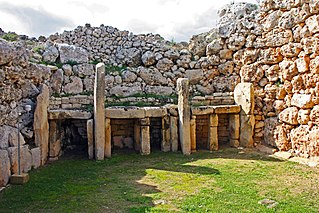
The Megalithic Temples of Malta are several prehistoric temples, some of which are UNESCO World Heritage Sites, built during three distinct periods approximately between 3600 BC and 2500 BC on the island country of Malta. They had been claimed as the oldest free-standing structures on Earth until the discovery of Göbekli Tepe in Turkey. Archaeologists believe that these megalithic complexes are the result of local innovations in a process of cultural evolution. This led to the building of several temples of the Ġgantija phase, culminating in the large Tarxien temple complex, which remained in use until 2500 BC. After this date, the temple-building culture disappeared.

Ta' Qali is a wide open space in the limits of Attard and Mosta in central and northern Malta respectively, which contains the national football stadium, the Malta Fairs & Conventions Centre, Ta' Qali National Park, a crafts village, and a national vegetable market which is locally known as the Pitkalija.

The Order of Knights of the Hospital of Saint John of Jerusalem, commonly known as the Knights Hospitaller, is a medieval and early modern Catholic military order. It was founded in the crusader Kingdom of Jerusalem in the 12th century and had headquarters there until 1291, thereafter being based in Kolossi Castle in Cyprus (1302–1310), the island of Rhodes (1310–1522), Malta (1530–1798), and Saint Petersburg (1799–1801).
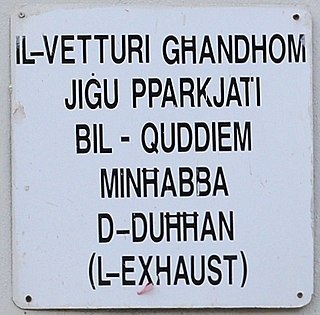
Malta has two official languages: Maltese and English. Maltese is the national language. Until 1934, Italian was also an official language in Malta, and in the 19th and 20th centuries there was a linguistic and political debate known as the Language Question about the roles of these three languages. The Maltese population is generally able to converse in languages which are not native to the country, particularly English and Italian. They can also somewhat understand Darija.

Education in Malta is compulsory through age sixteen and is offered through three different providers: the state, the church, and the private sector. The state is responsible for promoting education and instruction and ensuring universal access to education for all Maltese citizens the existence of a system of schools and institutions accessible to all Maltese citizens. The objectives of education in Malta include intellectual and moral development and the preparation of every citizen to contribute productively to the national economy. Although Maltese citizens had access to education during the Arab administration of 870 to 1090, the arrival of a number of religious orders in the following four centuries brought religious-based education to the island for wealthy families. The arrival of the Knights Hospitaller saw the establishment of the University of Malta, around which a number of primary, secondary and post-secondary institutions were established. Education in Malta has been universally available at the primary level since the ejection of the Knights Hospitaller by the French in 1798, when state-funded elementary schooling was established. In 1878, English replaced Italian as the primary language of instruction, and education was made compulsory in 1946 in response to a number of children not attending school due to poverty between World Wars One and Two. The age at which education became compulsory was lowered to five years in 1988

Gozo, in antiquity known as Gaulos, is an island in the Maltese archipelago in the Mediterranean Sea. The island is part of the Republic of Malta. After the island of Malta itself, it is the second-largest island in the archipelago.